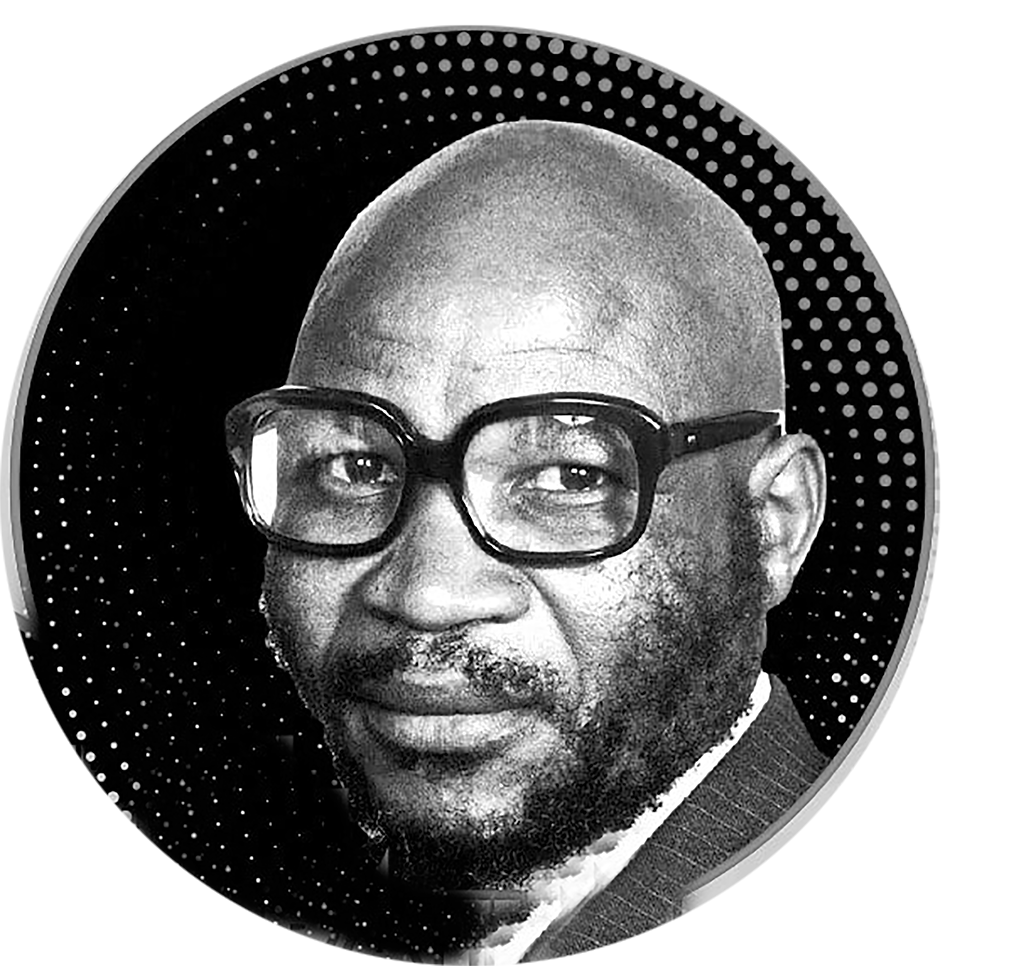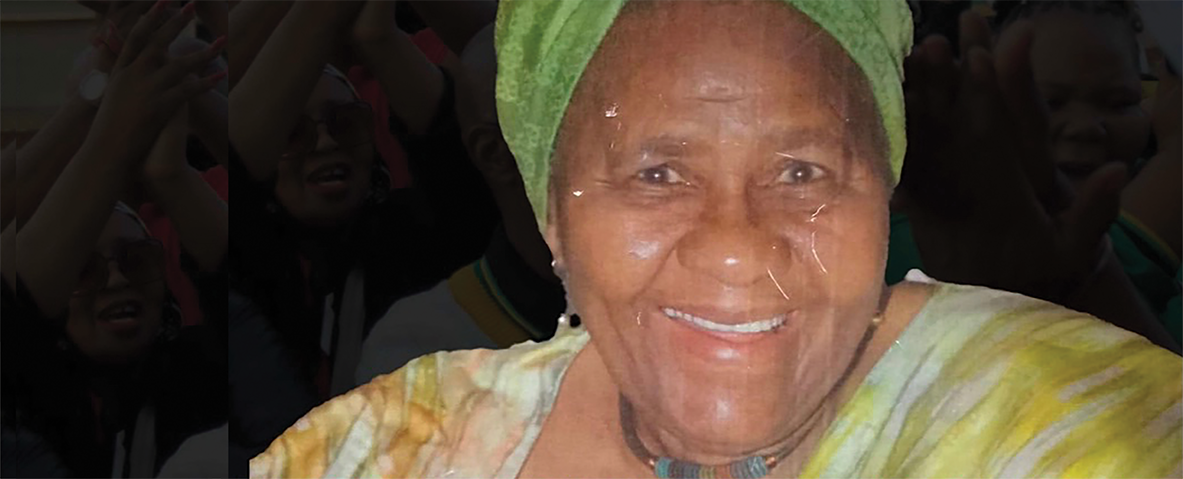HEROINE: Her lifelong mission to unravel the mystery circumstances surrounding her husband Joe Gqabi’s 1981 assassination, remains unfulfilled…
By Rapitse Montsho
ANC stalwart Mrs Nomazotho Aurelia Gqabi (nee Sikupela), who passed away at her Soweto home last week, will be buried tomorrow.

MaGqabi, as she was affectionately known, was born on January 2 1935, in a village called Ngcingwana Idutywa (in the former Transkei), now Eastern Cape. She was the daughter of Joseph Mgudluli Sikupela and Adelaide Teka Sikupela .
She met her future husband and ANC operative Joe Nzingo Gqabi while working as a nurse at Coronation Hospital in Johannesburg. Ggabi was living in Mofolo village with his mother and brother at that time. They got married in October 1958 and settled in Mofolo, where they were neighbours with the likes of Miriam Makeba and Robert Sobukwe.
In 1959, the Gqabi couple were blessed with their firstborn child, Nonkululeko Vuyelwa Gqabi, and in 1961, their son, Jomo Gqabi. Sadly, both of them have passed away.
MaGqabi said, in an interview in 2023, that she wanted to stress “that I did not know that he was involved in politics. Until we got married, I did not know he was a politician… So, I was really surprised when the police kept on coming to arrest him…
“He travelled to China, but then we, as their wives, were not told anything. All I knew was that he was going away for some time. That time I didn’t even know that he was going to China. Until he came back. Even when he came back, he didn’t tell me that he had gone for training. I only knew afterwards, when he got arrested, that he had gone to China for training.”
“The children did not know that their father was in jail. I did not tell them because they wouldn’t understand what jail was. So, I just told them that their father had gone somewhere for a holiday. He would be coming back soon. Until they grew a bit older. They wouldn’t take that for an answer, saying ‘No, you’ve been saying he’s coming back next year, and never tell us where he is’. Until I had to tell them that their father was in jail. He wouldn’t be coming back soon. So that’s when they understood.
“And they never saw their father for those 12 years. The kids growing up in that vicinity understood that Joe Gqabi, Sobukwe, and Makeba were “in exile”. ‘Exile’ had meanings defined by internal exile (Gqabi and Sobukwe on Robben Island) and external exile (Makeba then in the US).
MaGqabi was also a dedicated health worker. A colleague at the time, Dr Tim Wilson, got to know her really well as he trained her and six other nurses as the first Primary Health Care Nurses (PHCN) in South Africa. He recalled, “I came every morning from the comfort and safety of Parkview, while Aurelia and the others came from the chaos, anger, and resistance of Soweto.
In 1963, Gqabi was arrested in what was then Southern Rhodesia (Zimbabwe today) with a group of 28 who were going out for military training. Deported to South Africa, he was sentenced and ultimately had to serve 12 years on Robben Island.
This brought him up to 1975 when he completed his sentence. Back in Soweto he was again involved in underground organisation and with the struggle. He was in Soweto during the June 16 student uprisings, and because of his involvement, in December 1976 he was arrested and was one of the 12 ANC cadres who stood trial in Pretoria during 1977, charged under the Terrorism Act.
Because Gqabi was skilful in his underground operations, the regime could prove no offence against him and he was discharged. Subsequently, he escaped into Botswana and from there continued organisation inside South Africa.
During the 1976 student uprisings, she would use her professional training in assisting the injured youth, quietly, during their skirmishes with police.
Her dedication to serving her community was a constant throughout her life, and even when faced with the extreme adversity of apartheid and the sacrifices made by herself and her family, she remained steadfast. As an operative, MaGqabi distributed funds and food parcels to the families of the 1976 detainees.
Among her ANC underground tasks, which she executed excellently during the Pretoria 12 trial of 1978, in which her husband was one of the accused, she coordinated visits to the prison for family members of comrades Joe’s fellow accused and transported them at her own cost.
She earned a nickname among the trialists of “our angel”, simply because of her bravery and steady conduct, which fooled the apartheid police without any suspicion of her.
When the ANC got wind of security police plans by the regime to arrest the children, Jomo and Nonkululeko (Nkuli), a decision was taken to take them out of the country. They were 14 and 16, respectively, at the time. Nkuli went on to study in Cuba, and Jomo went to Angola.
In 1979, word came that MaGqabi, too, should leave the country for Botswana. She left in December 1979: “There was no Christmas anytime, anywhere at the time… You couldn’t tell anyone that you were leaving. You just left like a thief”.
She left the country on a Transkei passport. “I drove to Botswana and I found Joe waiting for me…”.
In what amounted to trial and tribulations for MaGqabi, she was never reunited with her family, including children, in those early years in exile. She got to see them again in 1981 in Harare, when she was going to bury her husband.
After the funeral, MaGqabi went back to Botswana where she continued arranging safe houses and passage for comrades travelling in and out of South Africa. She served the movement and the people of South Africa with all her heart, bearing no grudges or bitterness about the personal struggles meted against her family by the apartheid regime.
In 1986, she relocated to Harare to be near her husband’s resting place. She worked at Parirenyatwa Hospital in Harare, Zimbabwe, from 1986 until she returned to South Africa after the unbanning of all political organisations
Back in Soweto, she went on to work at the Jabulile Ndlovu Educare Centre, established in the inner city for children of trade union workers, the Communist Party, and ANC members. Thereafter, she joined the South African National Defence Force Medical Services (SAMS) until her retirement.
She was also a community worker and volunteered at Footprints Hospice in Orlando, Soweto. She was an active member of the Protea Glen Older Persons Service Centre, the Joe Gqabi Integrated Development Centre. She was a very independent woman, a member of the African National Congress and the ANC Women’s League.
A loving mother who always wore a broad smile, she was known for her chuckle at anecdotes from comrades or strangers. She had a golden heart, which did not discriminate between children of parents she did not know.
On April 20 2006, Mama Gqabi received – posthumously – the Award of Order of Luthuli in Silver on behalf of her husband, “for excellent contribution to the struggle for a democratic South Africa”. She also received an award conferred on him by the SA National Defence Force, a Medal in Platinum for Service and Bravery as a member of the Luthuli Detachment.
MaGqabi passed away on June 12, only four days before the commemoration of the June 16 1976 uprisings. This year is the 49th anniversary of the Soweto upheavals.
Sadly, her death brings up the unfinished business that preoccupied her till death: to know the full circumstances surrounding her husband’s assassination.
In her own words, expressed long before her passing, she had lamented: “Why must I forgive faceless people who have never asked for forgiveness? I am delighted to realise that 40 years since my husband was murdered, some investigation is now in progress, and this may bring to a closure the painful years that my children and I have suffered,” MaGqabi told media practitioner Rapitse Montsho in an interview in 2021.
But MaGqabi passed away before her lifelong wish could be granted.
MaGqabi leaves two grandsons Tebogo Fidel (born in Tanzania) and Sechaba (born in Zimbabwe) and granddaughter Sandise Avuzwa.


































